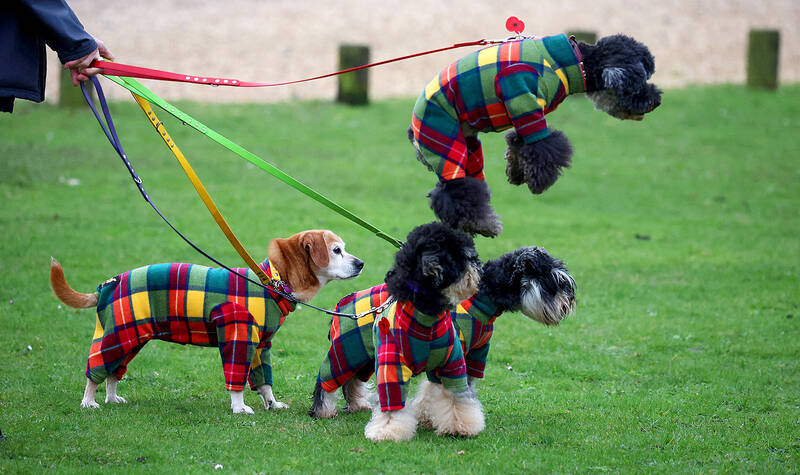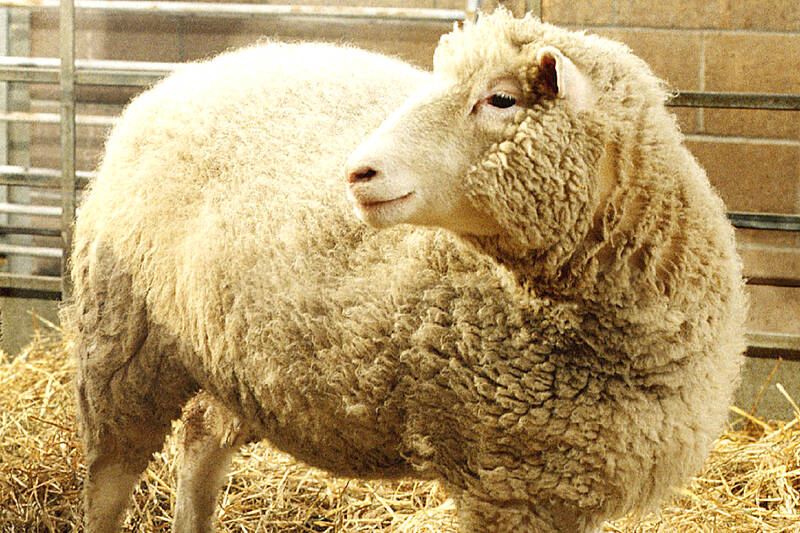At first glance, Gem is a happy spaniel. With a plush toy in her mouth, she is the embodiment of joy, but her straightforward demeanor belies the complexities of her origins. Gem is not a typical dog: She is a clone.
Since Dolly the sheep — the first mammal to be cloned using an adult cell — was revealed to the world in 1996, debate has raged over the potential for the technology and its ethical implications.
Yet the menagerie of animals cloned by researchers has continued to grow, from “Snuppy” the Afghan hound puppy to sheep, piglets, mice, cows and even macaque monkeys.

Photo: Reuters
Now the technology has moved into a new, commercial market: pets.
“Gem is actually a present from one of our clients, because she’s a clone of a working cocker spaniel,” said Lucy Morgan, the company and laboratory manager of the UK-based company Gemini Genetics.
“We get photos and things [from owners], but actually having a cloned pet that I can remember the day that her original skin sample came in ... yeah, she’s really quite special,” Morgan added.

Photo: AP
Pet cloning has becoming big business in the US, with Barbra Streisand and Paris Hilton among its early adopters.
Yet cloning animals is banned in the UK, except for research purposes. Even then, British Home Office approval is required.
As a result, Gemini Genetics does not conduct cloning itself — but it does facilitate the process, and has done so for about 30 such animals so far.
Based in Shropshire, England, the company comprises a small laboratory space housed within a complex shared with other companies including Stallion AI Services Ltd — an equine semen storage and distribution center that, among other activities, works with rare breeds.
Morgan — who previously worked for Stallion — said the origins of Gemini Genetics lay in this work: The only way to preserve a female line is by freezing skin samples — tissue that contains 100 percent of the donor’s DNA profile.
Morgan and colleagues later branched out, realizing the approach could also be used to clone endangered species, as well as companion animals.
The clients are largely the owners of non-pedigree dogs — lovable pets that are either facing the end of their life or have already died, she said.
Owners are “not wanting to create a carbon copy of their original or, if they phone us with that expectation, we talk them through the process and explain this isn’t about creating a carbon copy of the original pet,” she said. “Most cats and dogs are neutered, so when they do pass away, you haven’t got a son or a daughter or a brother or a sister, whichever way you want to look at it, to carry on that connection with them, and so that’s where the cloning comes in.”
The first step is for a veterinarian to take a tissue sample from the animal to be cloned — a 2cm square from the ear of a deceased pet, or a 6mm round sample from the chest, neck or inner thigh of a living one. That is sent to Gemini Genetics, where cells are cultured to check the DNA is viable for cloning.
The cultured cells, with the original tissue, are cryogenically stored on-site, ready for the go-ahead from the client for them to be shipped to the US. There, a company called ViaGen Pets and Equine creates the clone.
The cloning process itself is known as somatic cell nuclear transfer, and involves taking an egg from a female donor, removing its nucleus, and introducing an adult cell from the animal that is to be cloned. When an electric impulse is applied, the cell and the egg fuse, and the embryo begins to develop. That is implanted into a surrogate mother, where it gestates until birth.
The upshot is a twin of the original animal, which can be brought back to the UK under the same regulations that apply to pets conceived in the traditional way.
The role of Gemeni Genetics might seem like little more than a go-between, but it tackles the time-sensitive side of the process.
Once stored at minus-196°C, the animal’s samples can be preserved for an indefinite period, while the use of specialized liquid nitrogen shipping containers drastically increases the time a sample can be in transit while remaining viable for cloning, Morgan said.
Nothing about the process is cheap: It costs £1,600 (US$1,988) for Gemini Genetics to bank and culture a sample, or £2,200 if the second step is carried out later, with a storage fee of £12 a month. The production of the clone by ViaGen costs about US$50,000 for a dog or cat and US$85,000 for a horse.
However, just as identical twins have very different characteristics, cloned pets can be different, too.
“Behavior has got an environmental part to it as well,” Morgan said.
“Obviously the original pet has passed away, so it’s by no means a reincarnation, and 99 percent of our clients get that,” she said, adding that the team make sure clients fully understand the information before proceeding.
Clones can even look different: For example, markings can vary from those of the “original.”
However, cloning is not always about an emotional connection to a beloved pet. In some cases it is more a matter of business.
Behind Gemini Genetics is a block of pristine stables, within which is a large, immaculate gray stallion, Murka’s Gem.
He is also a clone from ViaGen, produced before Gemini Genetics was established, Morgan said.
Murka’s Gem’s “original” was Gem Twist, a famous show jumper who, as a gelding, could not sire his own offspring because he had been castrated — a common practice in competition horses, but cloning has removed that obstacle.
“They made two clones, and one is Murka’s Gem, who stands with us. The other one is a clone called Gemini, which stands at a stud in France,” Morgan said.
Murka’s Gem “is able to breed on behalf of the original horse, basically,” she said.
Not everyone in the horse world is enthusiastic about the rise of clones, with some seeing it as counter to the idea that breeding is about moving equine genetics forwards, she said.
However, others have embraced the technology.
In October, Chilli Morning IV — a clone of Chilli Morning, a hugely successful eventing stallion — scooped the seven-year-old world champion title at the Mondial du Lion equestrian event. Another clone of the same horse came sixth.
As well as enabling the bloodline of a gelding to continue, the approach offers a way to secure genetic diversity, Morgan said, adding that horse breeders tend to focus on producing a favored type.
“But actually we might, in 10 years’ time, find that the horse type that we had back then, we actually want to reintroduce,” she said.
Whereas clones are kicking up dust in the horse world, things are different in canine spheres, which Morgan said could be because horse breeders are already much more familiar with using assisted reproduction techniques.
Bill Lambert, spokesman of the UK’s Royal Kennel Club, said the world-famous dog show Crufts is not set up to accommodate clones.
“It would be very difficult to register a [cloned] dog under our current regulations, because a dog has to have a pedigree, parents, a family tree and it has to have a date of birth,” he said.
Morgan supports a shift in legislation around animal cloning, saying that while the US has developed the technology, existing laws have left the UK lagging behind.
“I think cloning will have an increasing role in conservation in the future,” she said. “So by not having it available over here, it may become a hurdle to future conservation needs.”
ViaGen has already cloned a number of animals, including the endangered black-footed ferret.
Others staunchly oppose the idea of making cloning more accessible in the UK.
“Losing a beloved pet can be heartbreaking, and owners may feel tempted to turn to cloning in order to replicate the special, emotional bond they have had,” Royal Kennel Club genetics researcher Joanna Ilska said. “However, there are significant welfare implications involved in this invasive procedure, and an owner’s grief should not be placed above the welfare of the dogs involved — both the puppies and the bitch used to carry the embryos.”
Elizabeth Mullineaux, president of the British Veterinary Association agreed.
“Commercial cloning is not currently legal in the UK, and given the ethical and welfare considerations, we would not support exporting the process with a view to reimporting the cloned pet,” she said.
Mullineaux and Ilska both add that there is no guarantee that the cloned animal would look or behave in the same way as the original, a point echoed by Robin Lovell-Badge, the head of stem cell biology and developmental genetics at the Francis Crick Institute in London.
“In my view, the only justifications for cloning an animal are to try to replicate one that is of high value for nonemotional reasons, [such as the] ability to run fast, be a good sniffer dog, have high milk or meat productivity, or for types of research where it is useful to reduce variability between animals,” he said. “If the intention is to try to replace a lost loved pet, whether cat, dog, horse or whatever, then cloning is very unwise. Why not find a different animal that deserves your love?”

Taiwan’s rapidly aging population is fueling a sharp increase in homes occupied solely by elderly people, a trend that is reshaping the nation’s housing market and social fabric, real-estate brokers said yesterday. About 850,000 residences were occupied by elderly people in the first quarter, including 655,000 that housed only one resident, the Ministry of the Interior said. The figures have nearly doubled from a decade earlier, Great Home Realty Co (大家房屋) said, as people aged 65 and older now make up 20.8 percent of the population. “The so-called silver tsunami represents more than just a demographic shift — it could fundamentally redefine the

The US government on Wednesday sanctioned more than two dozen companies in China, Turkey and the United Arab Emirates, including offshoots of a US chip firm, accusing the businesses of providing illicit support to Iran’s military or proxies. The US Department of Commerce included two subsidiaries of US-based chip distributor Arrow Electronics Inc (艾睿電子) on its so-called entity list published on the federal register for facilitating purchases by Iran’s proxies of US tech. Arrow spokesman John Hourigan said that the subsidiaries have been operating in full compliance with US export control regulations and his company is discussing with the US Bureau of

Businesses across the global semiconductor supply chain are bracing themselves for disruptions from an escalating trade war, after China imposed curbs on rare earth mineral exports and the US responded with additional tariffs and restrictions on software sales to the Asian nation. China’s restrictions, the most targeted move yet to limit supplies of rare earth materials, represent the first major attempt by Beijing to exercise long-arm jurisdiction over foreign companies to target the semiconductor industry, threatening to stall the chips powering the artificial intelligence (AI) boom. They prompted US President Donald Trump on Friday to announce that he would impose an additional

Pegatron Corp (和碩), a key assembler of Apple Inc’s iPhones, on Thursday reported a 12.3 percent year-on-year decline in revenue for last quarter to NT$257.86 billion (US$8.44 billion), but it expects revenue to improve in the second half on traditional holiday demand. The fourth quarter is usually the peak season for its communications products, a company official said on condition of anonymity. As Apple released its new iPhone 17 series early last month, sales in the communications segment rose sequentially last month, the official said. Shipments to Apple have been stable and in line with earlier expectations, they said. Pegatron shipped 2.4 million notebook